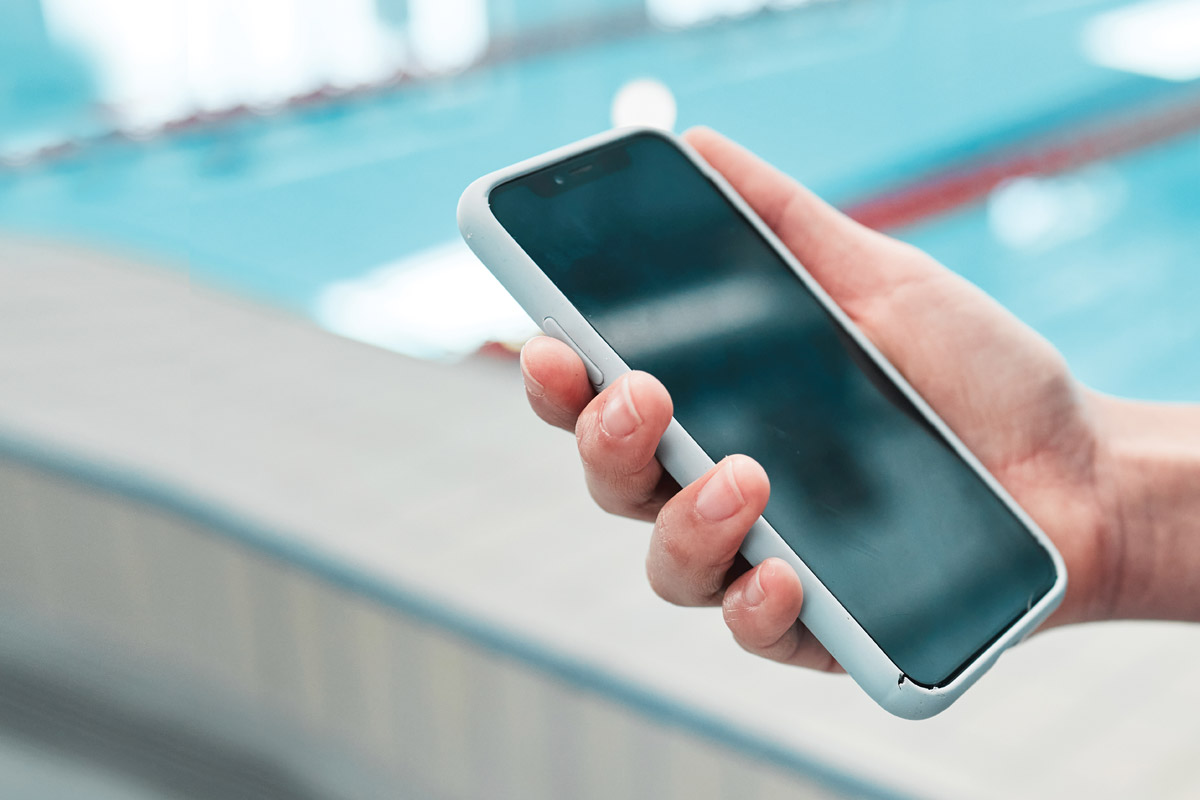Dialing In or Tuning Out

Perspectives on cellphone and headphone policies in the field
When working alone in a client’s backyard, cellphones can be great companions, allowing you to listen to a podcast or music or have a conversation. But while most workplaces have cellphone policies for people driving company vehicles and in-office employees, the rules for workers in the field are more ambiguous.
The decision to have a cellphone or headphone use policy — or not — is unique to each company.
“We don’t have a policy about it because it does get lonely out there in the field and you’re just listening to the wind,” says David Manning, maintenance manager of Manning Pool Service in Houston. “It’s a lot of reflection time, a lot of thinking.”
Having headphones or earbuds allows technicians to go hands-free, which decreases the potential distraction of holding a phone and is something Manning hasn’t heard any negative customer feedback about.
“Listening to a podcast definitely helps a day go by and helps me stay focused in the field,” Manning says. “We’re against using the phone [for calls] and having an active conversation because that deters your mind from thinking about the job at hand.”
Cellphones also allow technicians to answer work calls in the field, and using earbuds instead of holding a phone gives a more professional appearance, Manning says.
Overall, social isolation is the biggest factor for the company not having a headphone policy, Manning says.
Though headphones are allowed, technicians must ensure they’re paying attention and taking the necessary safety precautions, such as being aware of their surroundings and not stepping in a skimmer, mixing the wrong chemicals or potentially letting a dog out, particularly when in an unfamiliar backyard.
“Awareness needs to increase and cellphone [usage] needs to decrease when at a new customer’s house versus an [established] customer,” Manning says.
Spartan Pool & Patio in Norman, Oklahoma, has a similar philosophy but takes a different approach with its employees. Spartan’s phone policy has been in place for around seven years and includes guidelines about headphone use. While headphones are acceptable when a customer isn’t present, the policy states that using headphones or cellphone speakers for music, podcasts, radio shows, videos or personal calls cannot be done in front of a customer.
“The thing we’ve coached on is if the customer is present, give them your full attention,” says Swade Dungan, Spartan’s maintenance manager. “There are so many things [to be aware of] while cleaning a pool or being around a pool; [with] headphones in, you may not hear the pump running dry or a backwash line draining the pool.”
Dungan compares working in someone’s backyard to working in their house and says that if someone is working in your home, you wouldn’t necessarily want them listening to music on their phone. Backyards are still their property, he says.
We want to look professional and give our full attention because our customers are paying a premium for our service, and they ought to get a premium service.”
Swade Dungan, Spartan Pool & Spa
“We want to look professional and give our full attention because our customers are paying a premium for our service, and they ought to get a premium service,” he says.
Collin Parrish, owner of Blue Desert Pools in Gilbert, Arizona, agrees that professionalism is paramount. During onboarding, Blue Desert has new technicians sign the company policy that states personal calls are not to be taken on-site.
“The logic behind the policy is that we are in backyards early and don’t want to disturb clients with conversations outside their bedroom window, as well as [the need to] protect the privacy of our technicians and the professionalism of our business,” he says.
Most policies are born of necessity, he adds, but this one was created as a precaution when Parrish first started building his team. A specific policy about headphones hasn’t been created yet because there hasn’t been a need; Parrish says most of his employees only wear an earbud in one ear so they can hear music but still be aware of their surroundings.
“If I can’t trust my technicians to self-manage headphones, I feel like I shouldn’t employ them in the first place,” Parrish says.
To be aware of ambient noise, surroundings and other technicians, Dungan suggests only using one earbud, avoiding the use of noise-canceling earbuds and making sure the volume isn’t too high.
However, Dungan agrees that earbuds are useful because if a tech calls the office for help and a manager is walking them through a situation, they can use both hands while on the phone.
For companies deciding whether to create a policy about earbud and cellphone use, Parrish suggests looking at the company structure and whether technicians are W2 employees or contracted employees.
“If your technicians are 1099, you need more policies that are signed off [on],” he says. “If your technicians are W2, like ours, you get to know them and they’re part of your company.”
He says employees who are incorporated into an organization take on the company’s work ethic, mannerisms and communication style compared to contracted workers who operate as their own bosses.
Parrish suggests using artificial intelligence such as ChatGPT to create a quick policy that’s easily customizable and explaining it before asking employees to sign it.
Building on Parrish’s recommendations for phone and headphone policy creation, Dungan advises evaluating how enforceable the rules are, how large the team is and how the policy is approached.
Dungan cleaned pools by himself for five years and understands firsthand how quiet it can get working alone for up to 10 hours a day.
“I’ve been in their shoes, and I understand wanting to listen to music,” he says.






